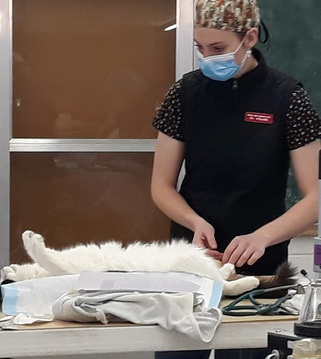The procedure costs too much, how can I afford it?
There are many resources available to people who need help financially to alter their pet. Visit our Spay/Neuter Help page to view our current clinics. The cost of taking care of even one litter far exceeds the cost of a spay/neuter procedure!
Will spaying or neutering make my pet fat?
Lack of exercise and overfeeding will cause your pet to pack on the extra pounds—not spaying and neutering. Your pet will remain fit and trim as long as you continue to provide exercise and monitor food intake.
My Female should have at least one litter, right?
There is no medical evidence to substantiate any benefits to allowing a dog or cat to have a litter before spaying. In fact, spaying female dogs and cats before their first heat is much easier on your pet. Smaller pets have less body fat, meaning less tissue trauma and less bleeding. Smaller pets need less anesthesia, meaning they will wake faster, and in most cases are able to come home the same day.
I don’t even own a pet. How is this my problem?
All of us are affected by homeless pets. Millions of tax dollars are spent annually to round up lost, abandoned, and unwanted pets. Much of that money is spent to destroy these animals when homes cannot be found. Health is threatened by the danger of transmittable diseases such as rabies, as well as animal bites and attacks. It is only when all of us assume the responsibility for the homeless pet population that we will see any decrease in the problem.
But won’t my neutered male feel less manly?
Your pet has no concept of sexual identity and ego. His biology and behavior developed in the wild to produce as many offspring as possible so his species could survive. In our modern world, this many offspring only add to the sum total of unwanted pets that end up homeless.
But don’t animal shelters take care of surplus animals?
Shelters do their best to place animals in loving homes but despite their best efforts many healthy and adoptable animals in our community are still susceptible to an untimely death due to overpopulation. It’s up to the community to be responsible pet owners and spay/neuter their pets.
My one cat or dog can’t make that much of a difference, can it?
It’s true that you may find homes for your pet’s entire litter. But each home you find means one less home for homeless animals in shelters waiting for their forever home. Furthermore, in less than one year’s time, each of your pet’s offspring may have his or her own litter, adding even more animals to the population. Then their offspring have offspring and so on and so on. By fixing your one pet you can help save hundreds, if not thousands, of lives.
My pet is purebred. Shouldn’t I breed at least once?
Many purebred pets end up in shelters just like mixed breeds. The Humane Society of the United States estimates as many as 25% of shelter dogs are purebred. Additionally, breeding in almost all cases requires a special permit, is costly, time consuming and does not create a clone of your pet.
Check-out Pawsitive Alliance's Spay/Neuter Help page for a list of our current Spay/Neuter programs.
Contact us at [email protected] or call 206-486-4PET with any questions, need spay/neuter help, or if you are interested in partnering with us to save lives.
There are many resources available to people who need help financially to alter their pet. Visit our Spay/Neuter Help page to view our current clinics. The cost of taking care of even one litter far exceeds the cost of a spay/neuter procedure!
Will spaying or neutering make my pet fat?
Lack of exercise and overfeeding will cause your pet to pack on the extra pounds—not spaying and neutering. Your pet will remain fit and trim as long as you continue to provide exercise and monitor food intake.
My Female should have at least one litter, right?
There is no medical evidence to substantiate any benefits to allowing a dog or cat to have a litter before spaying. In fact, spaying female dogs and cats before their first heat is much easier on your pet. Smaller pets have less body fat, meaning less tissue trauma and less bleeding. Smaller pets need less anesthesia, meaning they will wake faster, and in most cases are able to come home the same day.
I don’t even own a pet. How is this my problem?
All of us are affected by homeless pets. Millions of tax dollars are spent annually to round up lost, abandoned, and unwanted pets. Much of that money is spent to destroy these animals when homes cannot be found. Health is threatened by the danger of transmittable diseases such as rabies, as well as animal bites and attacks. It is only when all of us assume the responsibility for the homeless pet population that we will see any decrease in the problem.
But won’t my neutered male feel less manly?
Your pet has no concept of sexual identity and ego. His biology and behavior developed in the wild to produce as many offspring as possible so his species could survive. In our modern world, this many offspring only add to the sum total of unwanted pets that end up homeless.
But don’t animal shelters take care of surplus animals?
Shelters do their best to place animals in loving homes but despite their best efforts many healthy and adoptable animals in our community are still susceptible to an untimely death due to overpopulation. It’s up to the community to be responsible pet owners and spay/neuter their pets.
My one cat or dog can’t make that much of a difference, can it?
It’s true that you may find homes for your pet’s entire litter. But each home you find means one less home for homeless animals in shelters waiting for their forever home. Furthermore, in less than one year’s time, each of your pet’s offspring may have his or her own litter, adding even more animals to the population. Then their offspring have offspring and so on and so on. By fixing your one pet you can help save hundreds, if not thousands, of lives.
My pet is purebred. Shouldn’t I breed at least once?
Many purebred pets end up in shelters just like mixed breeds. The Humane Society of the United States estimates as many as 25% of shelter dogs are purebred. Additionally, breeding in almost all cases requires a special permit, is costly, time consuming and does not create a clone of your pet.
Check-out Pawsitive Alliance's Spay/Neuter Help page for a list of our current Spay/Neuter programs.
Contact us at [email protected] or call 206-486-4PET with any questions, need spay/neuter help, or if you are interested in partnering with us to save lives.












